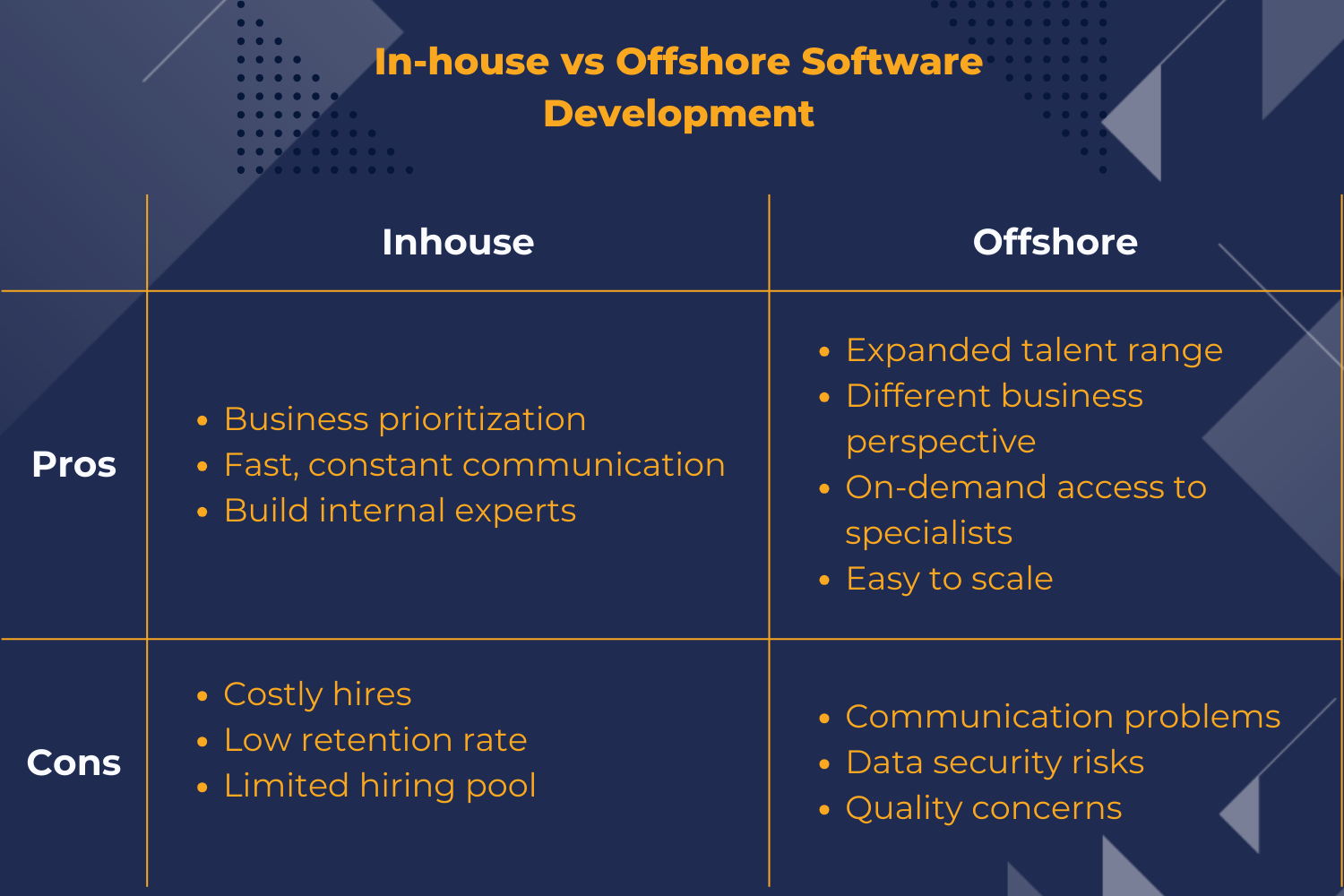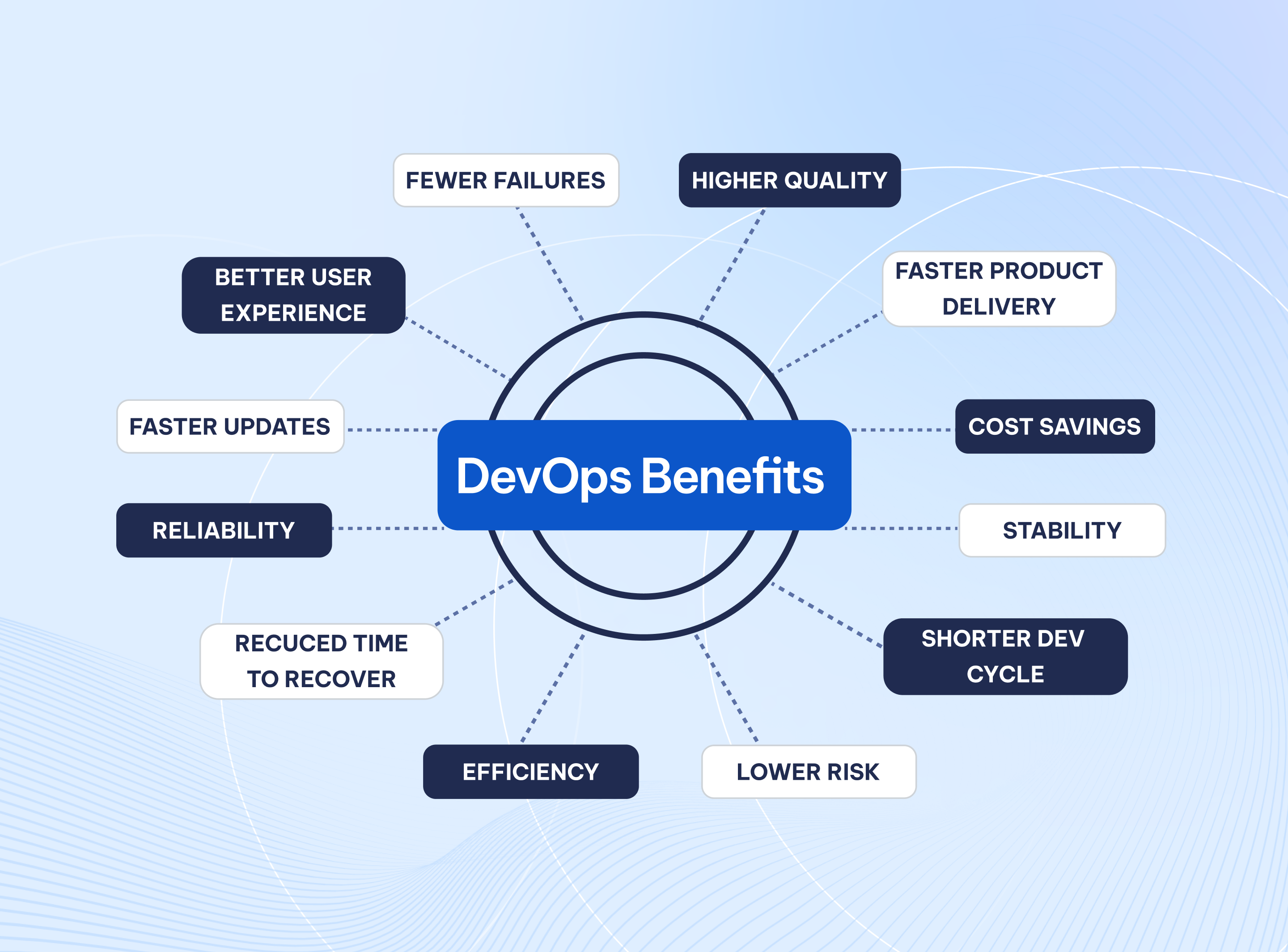Pros & Cons of In-house VS Offshore Software Development
Published on Dec 6, 2023
Introduction
Offshore development has started to gain a lot of popularity in the past decade, and many businesses with incompatible local workforces are looking into this cost-effective opportunity.
Despite this, many still consider hiring an offshore team to be a major gamble. This article is here to debunk your concerns on whether to directly scale up your in-house team, or let the offshore vendor lend you a hand.
Before we begin, here is a quick summary of what in-house and offshore software development can bring you:

In-house software development
Pros
Allows business prioritization
In-house team is yours and yours alone, so they will be able to prioritize tasks quickly, provided they have enough resources, as opposed to an offshore team who will have to juggle between your projects and many other client’s projects and may not have enough resources to prioritize your projects should emergency tasks occurred.
An in-house team, which is solely yours, can efficiently prioritize tasks if they have sufficient resources, unlike an offshore team that may struggle to balance multiple projects and may not have sufficient resources for emergency tasks.
Direct and streamlined communication
This is a no-brainer, sharing the same location and language can contribute a lot to a successful communication flow. Expectations and requirements will also be more clearly defined in the case of an in-house team, and any sudden occurrences can be quickly tackled with no wait time.

Building internal experts
A factor that comes exclusively with having an in-house team is that in time, your members will become more proficient and knowledgeable about your workflow and project knowledge, and can be deemed as highly skilled employees.
On the other hand, an offshore team will only achieve this benefit if you are using some form of long-term working model with them, such as a Dedicated Team business model.
Mutual understanding and high ownership
In-house teams are more closely connected to the company’s culture, mission, and values — not only will the team be easier to work with, but they will also be more likely to develop a stronger sense of ownership at work.
Cons
Costly hires
Using an in-house team means spending money for both recruiting and maintaining the crew — creating a cost-consuming factor that business owners should consider whether it is worth it or not.

Low retention/ high turnover rates
A recent trend among many young developers is a lower retention rate, and there’s nothing much you can do about this problem.
However, this weakness can be very annoying when your area has a limited hiring range, leading to a slow recovery when your business is losing manpower.
Limited recruitment pool
Building an in-house team in an unfavorable location will cost you a lot of time and money, and it is not guaranteed that you will even be able to succeed.
Even worse, competition from local businesses, especially in high-tech areas, can make it difficult for you to find available workers.
Offshore software development
Pros
Expanded talent range
Moving your business range to another continent means a whole new hiring pool to dive into. This is extremely beneficial if your headquarters office is not located in an advantageous area.

Moreover, offshore development teams in Asian countries typically work for much lower rates than developers in the US or UK, and all the hassle that comes with hiring will always be done in advance by the offshore firm, saving you both money and time.
Different business perspective
A different perspective can give you more ideas on how to tackle your products, this can be vital in retaining creativity in the process. This advantage can be very beneficial if you are planning to penetrate a market abroad or wants to have more idea during the beginning phases of your projects.
On-demand access to specialized talents
Access to a bigger talent pool will help you when your original location is lacking IT specialists in fields such as big data, blockchain, artificial intelligence, etc.
This will not only save you time and money but maintaining and staffing these specialists post-project becomes a non-issue, saving you and your crew from all the stress and worries.
Easy to scale
Certain projects might require your team to scale up/down — a task that is very difficult for in-house teams but is trivialized when using an offshore team.
Cons
Communication problems
This is an age-old problem that comes with having a team from afar, but it’s worth mentioning again. Problems such as language barriers, timezone differences, and clashes between working styles and cultures will always occur.
Thanks to the recent improvement of communication/management tools made to support remote work, offshore development has become easier to handle. As such, this problem has quickly become less of a disadvantage and more of an inherent challenge that every offshore firm worth its salt must learn to overcome.
Risk to data security
A problem inherent in offshoring is that your sensitive data is at risk of a security breach — leading to legal problems that could cost a lot of money to solve.
What you should do to rectify this problem is to ensure that the offshore firm signs a contract entailing which sides are responsible during cases of security breach, as well as integrate security protocol into your development process to ensure maximum security.

Quality concerns
Since quality and skill standards for hires are different in other countries, there is a concern among many businesses that the quality of their products will be affected — further emphasized by the feelings of paying for cost-effective services to get the job done.
Despite this, all offshore firms are willing to match themselves to the standards that businesses may live up to. However, it is up to you to communicate your standards clearly to the firm to ensure transparency.
Which one is the best approach for software development?
As a matter of fact, no team is better than the other, how compatible they are with the type of projects you are thinking of should be decided by you alone. What we would recommend is to consult with the offshore firm of your choice to see how they can benefit you.
With that said, we would advise you to look at the following factors when considering whether to offshore or not:
- Project scope
- Timeline
- Budget
- Possibility of scaling
- Current access to talents at your location
In-house VS offshore software development — closing words
Deciding between using in-house development or offshore development should be considered carefully, as each methodology offers different sets of advantages and comes with its own extra challenges that you should tackle to ensure a successful project.
Consider the many factors and see whether you want to incorporate an offshore team or not. To make it quicker, reach out to us for a consultation and see how your projects can benefit from offshore software development here.











